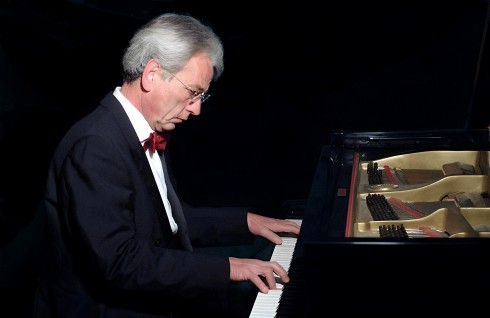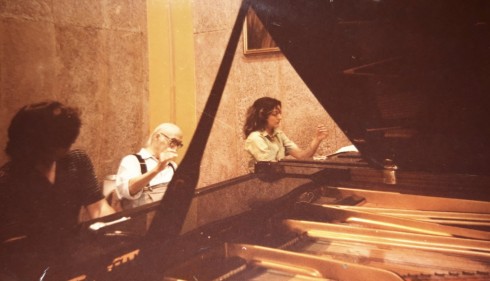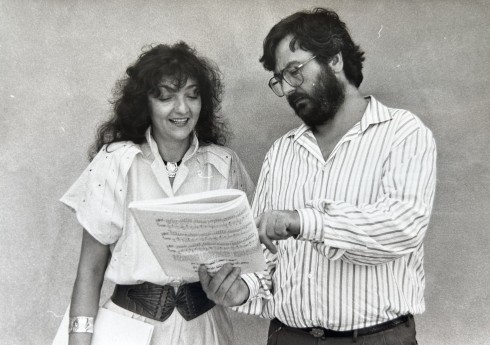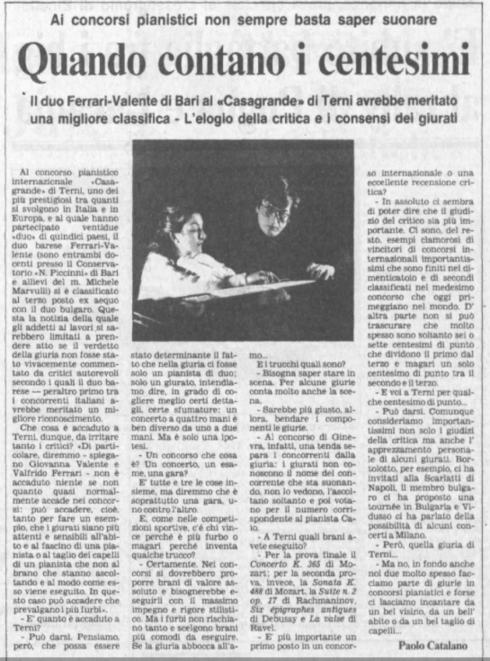Title: Lost Tapes Vol. 13 B – Duo Valfrido Ferrari-Giovanna Valente
Groups: Piano Duo, Piano Duo with orchestras conducted by Rino Marrone and Michele Marvulli, Carlo Zecchi’s Lessons to Accademia Musicale Pescarese
Year: 1978-1987 © 2023
Graphic: 3Heads Agency
Text: Livio Minafra, Anna Guerriero, Alvise, Valeria and Rocco Ferrari
Translator: Rita Valentini
Recorders: Giorgio Cavaglieri and unknown
Discover, digitalization, sound track selection, editing: Livio Minafra
Mastering and restoration sound engineer: Gianluca Caterina
Label: Angapp Music – It
Produced by: Livio Minafra
Valfrido Ferrari was born on January 1, 1949, in Giuliano di Lecce, a small town near Santa Maria di Leuca in Salento. The whole region of Puglia has been a territory of high-level band traditions, and during the patron saint festivals, the bands would go around cities and towns playing a repertoire of opera arias and the most famous pieces from the classical repertoire.
It was during these occasions that young Valfrido had the opportunity to discover music. Although he didn’t come from a musical family, his parents soon noticed his great musical aptitude when he started playing by ear on an accordion that had been given to his brother.
When his parents moved to Switzerland for work reasons, Valfrido, who was around six years old at the time, had the chance to take piano lessons in Neuchâtel from a teacher who immediately recognized and nurtured his talent. This eventually led him to win a piano competition held at the La Paix Theater in Neuchâtel.
At the age of 12, he returned to Giuliano with his family and started teaching accordion to children his age. At the same time, he began studying with Maestro Angelo Schirinzi in Gallipoli.
Maestro Schirinzi was the perfect teacher for Valfrido. He had studied composition and piano at the Santa Cecilia Conservatory in Rome, played the accordion, conducted several bands, and enjoyed playing popular music and scoring silent films in cinemas. Upon discovering that Valfrido couldn’t read sheet music but learned the musical pieces his teacher played during the lessons by memory, Maestro Schirinzi guided him by teaching him music theory and sight-reading, while also taking advantage of his musical ear and his ease of memorization.
During those years, Maestro Schirinzi gifted Valfrido with various sheet music, each one accompanied by a dedication of esteem and affection for his promising student. With pride, he accompanied Valfrido in his studies until he obtained his Piano Diploma at the Music High School in Taranto. Valfrido graduated with the highest honors, a score of Ten and Praise, and received accolades from the commission president, Maestro Antonio Trombone, as well as the examiners, including Camillo Baccigalupi. There is even an article in the Gazzetta del Mezzogiorno from October 26, 1968, as proof.
In 1969, Valfrido was sent to serve in the military in Sicily, and a dear friend of his, the owner of the Gran Hotel in Palermo, allowed him to practice in the events hall. It was there, while enjoying playing and arranging songs, that he was heard by Mina, who greatly appreciated his talent and asked him to accompany her in some songs.
Upon returning from military service, he started teaching music at a young age in a nearby town called Presicce, while continuing his studies. In 1974, he participated in the “Coppa Pianisti d’Italia” in Osimo, where he met Maestro Michele Marvulli, an eclectic musician recognized at the European level, capable of transitioning from Mozart to jazz. Marvulli highly appreciated Valfrido and reported his special talent to Maestro Nino Rota, who was then the director of the Conservatory in Bari. Rota immediately took action to locate Valfrido and invited him to join the faculty of the Conservatory in Bari, selecting him as the principal piano teacher. Valfrido held this position continuously from 1975 until his retirement in 2012.
The important turning point of his teaching position at the conservatory did not preclude Maestro Ferrari from continuing his career as a solo concert pianist. In particular, thanks to his encounter with colleague Gianna Valente, the Ferrari-Valente Piano Duo was formed in 1975. This collaboration led to the rediscovery of the extensive repertoire for two pianos and four hands, which was still relatively uncommon and unknown during those years.
Due to their shared musical taste, sensitivity, and preparation, the Ferrari-Valente Duo soon became a point of reference throughout Italy and Europe. They participated in some of the most prestigious international piano duo competitions, such as Alessandria in 1976, Belgrade in 1976, and Casagrande in 1980.
After the Casagrande competition, thanks to the appreciation of the jury, particularly Maestro Mario Bertolotto, the Duo was invited to perform with the Scarlatti Orchestra of Naples. Similarly, after the Belgrade competition, the director who had conducted them in the finalist concert, Maestro Remus Georgescu, invited the Ferrari-Valente Duo to embark on repeated tours, performing repertoire for duos as well as soloists with the Romanian Orchestra of Timisoara. Over the course of nearly thirty-five years, Ferrari and Valente performed complete works for piano duos and four hands by Mozart, Clementi, Debussy, Beethoven, Ravel, Brahms, Schumann, and Bartok. They also performed major concertos for two pianos and orchestra for prestigious concert organizations in different countries and gave national premieres of contemporary repertoire, including Luciano Berio’s Concerto for Two Pianos and Orchestra at the Teatro alla Scala in 1996.
Giovanna Valente recalls: “Playing with someone presupposes a human and musical encounter that must be based on feeling good together, living the common work with love and dedication. Valfrido and I were colleagues at the Bari Conservatory, him since 1975 and me already three years prior. It was Maestro Michele Marvulli who encouraged us to pursue the piano duo, recognizing our shared affinity in taste, sensitivity, determination, and basic preparation. Thus, this wonderful experience was born and had a long life! Not to mention the opportunity to teach ‘Piano Duo’ at the Pescara Music Academy in the 1980s, together with colleagues such as Donato Renzetti, Bruno Mezzena, Paolo Bordoni, and Massimo de Bernard. Besides teaching many young pianists, we guided them toward the field of piano duos. Faded memories over time but etched in the heart and mind.”
In addition to the historic Duo, Valfrido also engaged in chamber collaborations, including duos, trios, quartets, and quintets. Particularly notable is the partnership born out of a deep friendship that connected Valfrido with violinist Marek Rose and cellist Antoni Malisievich. They performed countless concerts initially under the name Trio Chopin and later as the Trio di Bari, with Antonio Sanarica replacing Malisievich.
Valfrido’s career also took other paths. As a profound connoisseur of opera, he held advanced courses as a concertmaster, working with numerous singers, including many from South Korea, where he was annually invited to teach courses, perform solo concerts, and play as a soloist with the National Orchestra of Seoul.
Winner of multiple awards as a soloist, including “Franz Liszt,” “Taranto,” and “Alessandria,” he made numerous recordings for both Italian and international state radio and television broadcasters. His experience also extended into the field of conducting: he studied Orchestra Conducting with Maestro Donato Renzetti, conducted the Salice Salentino Band (Lecce), and later collaborated as a conductor with various orchestral ensembles. He served as the Principal Conductor of the Piccinni Ensemble of the Piccinni Foundation in Bari (of which he was also Vice President and Artistic Director), alternating between his activities as a soloist and orchestra conductor on prestigious stages in Switzerland, France, South Korea, Ireland, Adana (Turkey), Belgrade, and Timisoara.
An eclectic artist and lover of art, Valfrido Ferrari was invited to participate in various events where music merges with painting and the sciences. These include the “Art & Science” event at the Petruzzelli Theater in Bari, in collaboration with art historian Philippe Daverio, as well as various exhibition-concert events, including one in the Sala delle Muse of the Petruzzelli Theater in Bari on “The Colors of Gershwin, Granados, and Albeniz’s Music and the Paintings of artist Valeria Ferrari, his daughter.”
A loving father to Alvise, Valeria, and Rocco, he acted as a surrogate father and mentor to dozens of students who grew through his invaluable musical teachings during their studies. His orchestral vision of the piano, his sensitive pianistic touch, and the vital inspiration that emerges from his performances, which we can now listen to, are his distinctive characteristics: a sound that could be ethereal and velvety, soft and sweet, but suddenly transformed into strength and power.
Freshness, creativity, playfulness, and wisdom are perhaps the terms that best describe his performances, but above all, they have always characterized his way of being in life.
There are numerous concert recordings that remain, some of which were made by Giorgio Cavalieri with suitable equipment, while others were captured with less professional means. These recordings are only a small testament to Maestro Ferrari’s extensive concert activity, and they particularly lack recordings of important collaborations he had with colleagues to whom Valfrido was emotionally connected. However, listening to his performances undoubtedly gives us the opportunity to experience his presence and his music again, like an uninterrupted thread that continues to unfold over time, without end…
Livio Minafra, Rocco, Valeria and Alvise Ferrari, Anna Guerriero
Carlo Zecchi addressing the Ferrari-Valente Duo: “Bravo. Not just pianists but musicians. You do honor to your name, to Italy, and your Maestro Michele Marvulli”.

 English
English Italiano
Italiano



